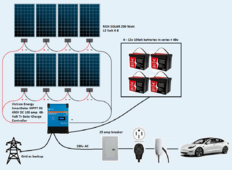John117
New Member
Hi guys, I am planing on doing a solar project and saw a video saying that 48v batteries are the way to go nowadays. Because it is more efficient and cheap. I understand the efficient part, because you don't need thick cables, and that's the same reason it should be cheaper, right? (less copper)
Looking for batteries on Amazon I get these 2 as an example, obviously the 1k one is HUGE, and it should have more capacity but is it cheaper like watt-hour or something?
51.2V 100AH LiFePO4 Battery $1,099.99
12V 100Ah LiFePO4 Battery $170.99
I am guessing that W=Volts x Amps, right? Why not advertise the watts? And what if I have 4 solar panels that are 200w each but at 12v? Even if I connect them in series I can only get 48v, is that enough to charge the huge battery on this example? Do I have to always have a higher voltage than the battery in order to charge it right? So I probably have to add another panel in series to get 60v? I know panels are now coming in higher voltage also. But I just want to understand this.
**************************************************UPDATE ************************************
I just wanted to add my idea to see what you guys think

Thank you in advance!
Looking for batteries on Amazon I get these 2 as an example, obviously the 1k one is HUGE, and it should have more capacity but is it cheaper like watt-hour or something?
51.2V 100AH LiFePO4 Battery $1,099.99
12V 100Ah LiFePO4 Battery $170.99
I am guessing that W=Volts x Amps, right? Why not advertise the watts? And what if I have 4 solar panels that are 200w each but at 12v? Even if I connect them in series I can only get 48v, is that enough to charge the huge battery on this example? Do I have to always have a higher voltage than the battery in order to charge it right? So I probably have to add another panel in series to get 60v? I know panels are now coming in higher voltage also. But I just want to understand this.
**************************************************UPDATE ************************************
I just wanted to add my idea to see what you guys think

Thank you in advance!
Last edited:


